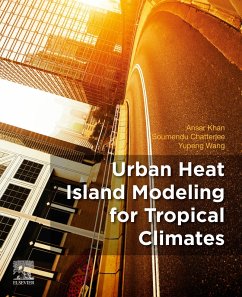Urban Heat Island Modeling for Tropical Climates takes into account the different urban physics in tropical environments, presenting a way of UHI scaling for tropical cities. Topics include measuring, modeling and proper mitigation strategies, which account for the surface energy balance of tropics. Tropical cities are more susceptible to the effects of projected global warming because of conditions in tropical climates and the rapid growth of so many cities in this zone. The need for research on measuring, modeling and mitigation of UHI effects in tropical cities is of growing importance.
This book walks through the basics of Urban Heat Islands, including causes, measurement and analysis then expands upon issues as well as the novel techniques that can be used to address issues specific to the region.
This book walks through the basics of Urban Heat Islands, including causes, measurement and analysis then expands upon issues as well as the novel techniques that can be used to address issues specific to the region.
- Reviews topics related to understanding the fundamentals of modeling and impacts of urban heat islands
- Covers many techniques, from remote sensing, to numerical modeling and then applying them to urban climate studies in general, and in tropical cities
- Describes the scaling of urban heat islands based on long-term seasonal thermal parameters as feature-based classification systems using a probabilistic and fuzzy logic approach, unlike local climate zones (LCZs)
Dieser Download kann aus rechtlichen Gründen nur mit Rechnungsadresse in A, B, BG, CY, CZ, D, DK, EW, E, FIN, F, GR, HR, H, IRL, I, LT, L, LR, M, NL, PL, P, R, S, SLO, SK ausgeliefert werden.


